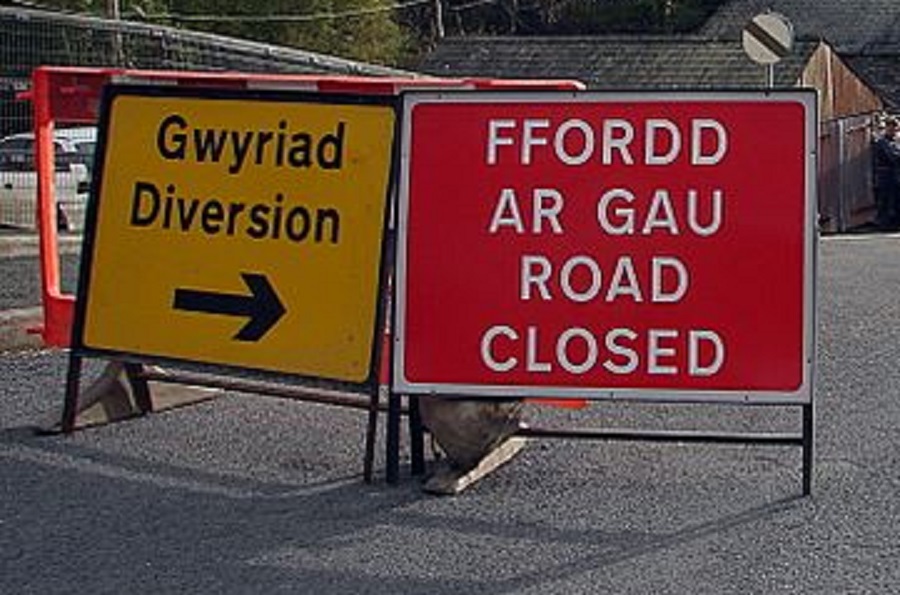‘Doing their bit for diversity’: Local bemused as Welsh language road signs appear in Worcester

Worcester may have once been part of the Welsh marches but that did not reassure bemused locals who reacted with surprise to the appearance of Welsh signage in the city.
The bilingual road signs saying ‘Ffordd Ymlaen ar Gau’ and ‘Gwyriad’ were placed by the Norton Road roundabout in the St. Peter’s part of the city known in Welsh as Caerwrangon.
They were spotted by St Peter’s parish councillor John Renshaw who informed the local paper, the Worcester News.
“I expect that the Welsh language population of St Peter’s is vanishingly small,” he told them. “Still, it’s great to see Worcestershire County Council doing its bit for diversity!”
The newspaper responded by asking its readers in Welsh: “Ydych chi wedi cael trafferth darllen arwyddion ffyrdd yn ddiweddar?” (Have you had trouble reading road signs recently?)
Worcestershire Council however said that the signs were not theirs but rather the responsibility of Severn Trent, a water company that also serves part of the north of Powys.
A spokesperson for the council said: “The signs are not related to our work and we believe that they belong to the contractors working on the industrial park site.
“Severn Trent are working on the closure on Norton Road.”
Worcestershire was from the 15th to 17th centuries administered by the Council of Wales and the Marches, which also covered modern Wales as well as Shropshire, Herefordshire, Cheshire and Gloucestershire.
Westminster accidentally ceded much of the area back to Wales recently when a petition covering the catchment areas of the rivers Severn and Wye has was rejected on the basis that they are “Wales’ responsibility”.
Support our Nation today
For the price of a cup of coffee a month you can help us create an independent, not-for-profit, national news service for the people of Wales, by the people of Wales.






Wedi gweld arwyddion dwyieithog – Saesneg a Sbaeneg – yn Benllech cyn hyn.
Mae na arwydd wedi bod yn fan hyn, Swydd Bedford, gyda’r ymadrodd, “Diversión”
Rhyw led-Sbaeneg, debyg! 😉
Although their Daily Newspaper said tongue in cheek how they were doing their part for diversity. But If the people of Worcestershire really knew that the only foreign language on display was English and how their county was once a Welsh tribal area held by the Dobunni in the iron age.
Typical colonialist attitude from you. Wales doesn’t need to colonise England, thank you. Stop trying to claim land that doesn’t belong to us.
Years ago while working in Stroud I met a road gang from Merthyr with some bilingual signs and asked why they were there.
“Well they did hire some English boys but nobody could find the on switch so they sent for us…. like always.”
Da iawn yn wir. Yr iaith frodorol yn cael ei defnyddio yn y Tiroedd Coll.
Good to see some correct translations even if very simple. Borough of Bridgend, as Penybont ar Ogwr is known in English, has used some howlers in the recent past as have other local authorities and public bodies. I don’t have ready access to any kind of historical record or archive of these things but they are hilarious to view and should serve as a warning to people inclined to use things like Google translate.
don’t have ready access to any kind of historical record or archive of these things
____
Try googling ‘Scymraeg’ or using my MA thesis (Uni of Wales, 2011). There are collections, groups, books on this very subject.
Diolch
Has nobody considered the possibility they just nicked them?
Bilingual signs often appear on the Wirral and parts of Shropshire due to the same reasons. The locals many of whom are of welsh decent or even welsh born accept them.
Only the city of Chester seems to have occasional issue – the welsh bus and train announcements despite welsh chapels and societies there
Why can’t we have S4C in Ireland as we used to have until recent years?
Probably still accessible on the SKY menu
Access Services | S4C
Saw some yellow electricity pole “man-getting-struck-by-a-bolt-of-lightning” signs a few years ago with the warning “Perygl Marwolaeth!”. (Danger of Death) and that was all the way down in Dorset.